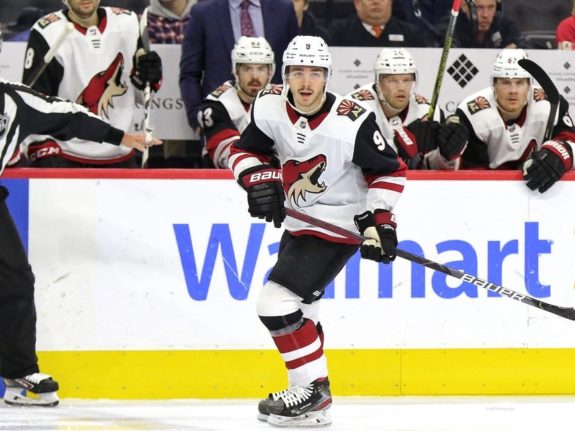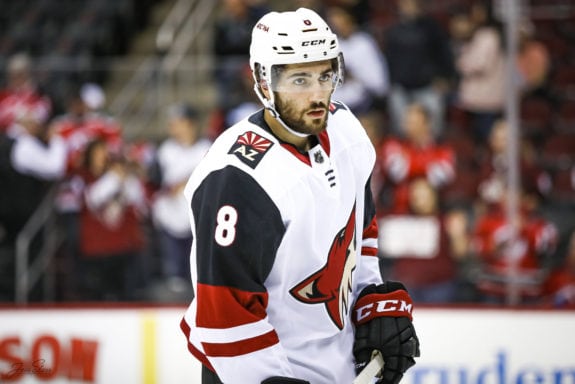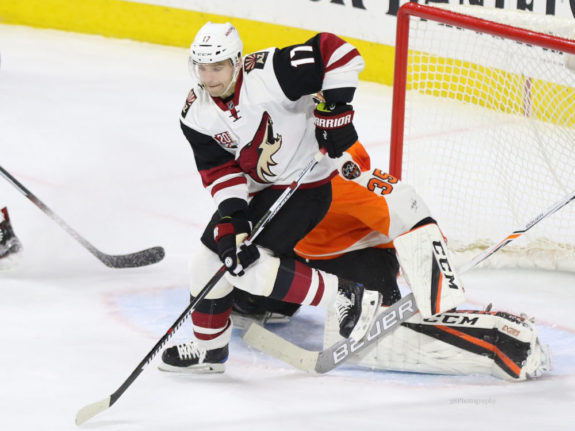It’s no secret that the offense hasn’t been the strength of an Arizona Coyotes team since…. well, ever. The ‘Yotes moved to the Valley of the Sun 25 years ago, and, since then, they’ve scored the second-fewest goals in the league, at 2.58 per game. They finished in the top-10 in goals only once, in 2001-02, and haven’t finished better than 20th in scoring since 2011-12.
Until this organization is able to draft and develop top-tier talent on a regular basis, scoring is likely to be a problem, so they’ll need to continue winning games in the manner in which they did so in 2019-20 – with outstanding defense and goaltending, along with a scoring-by-committee approach at the other end.
These efforts will be bolstered in 2020-21 if the Coyotes’ three highest-paid forwards – Clayton Keller, Phil Kessel, and Nick Schmaltz – are able to help out offensively on a regular basis. Across the NHL, there have been 379 different 60-point seasons from various players throughout the past eight years. Meanwhile, the only Coyotes’ skater to reach that mark since 2011-12 was Keller, in 2017-18. This needs to change in 2020-21, and Arizona’s highest-paid forwards need to be the ones leading the way.
Coyotes Counting on Keller
First and foremost in this group is the 22-year-old Keller, who has just wrapped up his entry-level contract and is now into his eight-year deal with an average annual value of $7.15 million. With the increase in pay comes an increase in expectations and responsibility, and Keller will need to reverse the trend in his play that has emerged over his first three years in the league.
After a breakout rookie season in 2017-18 where Keller posted 65 points, hopes were high that the Coyotes had finally found the game-breaking forward that they’d spent the better part of the prior two decades searching for. However, Keller’s play declined in Years 2 and 3, as he posted 47 and 44 points, respectively, and failed to match the 23 goals or the 42 assists he recorded as a rookie.

With star forward Taylor Hall now playing for the Buffalo Sabres, Keller is expected to lead Arizona’s offense in 2020-21. He’s fresh off of a solid performance in the Edmonton playoff bubble, where he posted seven points in nine games, and he collected two points in Thursday’s opening-night shootout loss to the San Jose Sharks, so there’s reason for optimism here.
If Keller is able to produce consistent offense at even strength and help the team’s power play, the Coyotes should be in good shape and should be in the conversation for the West Division’s fourth playoff spot in May as the season winds down. If not, it could be a long year in Glendale.
Schmaltz, Kessel Must Rebound
While Keller is the main piece of the Coyotes’ forward group, Kessel and Schmaltz are not far behind. Arizona’s second and third-highest paid forwards, respectively, Kessel and Schmaltz had down years in 2019-20, but Kessel’s production was especially concerning.
‘Phil the Thrill’ endured an injury-plagued 2019-20 season, his first in Arizona. His ironman streak is now up to 845 games, but one could argue that he would have been better off sitting for a few games in order to recover from the various ailments he was attempting to play through.

At any rate, Kessel posted arguably his worst season as a pro last year, with just 14 goals and 24 assists, good for 38 points. This came after a three-year run in Pittsburgh where Phil racked up 244 points in 246 games. Obviously, this is a huge drop-off in production. While it’s true that leaving a team with Sidney Crosby and Evgeni Malkin would result in most NHL players seeing a decrease in offensive output, Kessel’s play fell off of a cliff last season in a development that few saw coming.
As with Keller, though, Kessel got out to a good start in 2020-21, scoring the biggest goal of his Coyotes tenure with 3.2 seconds left in the third period on Thursday at Gila River Arena:
When it comes to Schmaltz, the Coyotes are looking for consistency from him this season. Acquired from the Chicago Blackhawks on Nov. 25, 2018, in the trade that sent 2015 third-overall pick Dylan Strome to the Windy City, Schmaltz is in his third year in Arizona. He enjoyed a brief run of success in 2018-19 after coming over from Chicago, posting 14 points in his first 17 games in the desert (a 68-point pace) before going down with a knee injury on Dec. 30, 2018.
Coyotes Need Consistency from Schmaltz
Last year, Schmaltz posted 45 points in 70 games, which is fine and equates to a 52-point pace over a full 82 games, but he was invisible for large parts of the season. In a 16-game stretch between Nov. 7 and Dec. 6, Schmaltz scored only once to go with five assists, while in 18 games from Jan. 7 to Feb. 17, the Madison, WI native endured a seven-game scoring drought while posting just a single goal along with four helpers.

These offensive downturns were offset by two 13-game hot streaks where Schmaltz averaged better than a point per game. From Oct. 10 to Nov. 5, the 24-year-old collected 4 goals and 10 assists, while from Dec. 8 to Jan. 4, Schmaltz scored twice and added 13 helpers, for a combined total of 29 points in 26 contests.
Unlike the rest of his teammates, Schmaltz did not have a chance to build upon his regular-season performance in the Edmonton bubble, as he was the recipient of a questionable hit from noted Vegas Golden Knights’ tough guy Ryan Reaves in an exhibition game between the two Pacific Division rivals on July 30. Schmaltz suffered a head injury on the play and missed both the qualifying round against the Nashville Predators as well as the first-round series against the Colorado Avalanche.
In 2020-21, Schmaltz will need to become a more consistent scorer in order to avoid being labeled as a “streaky” player, as was the case with many Coyotes players in the past, most notably so for winger Radim Vrbata, who was notorious for going long stretches without scoring before coming out of seemingly nowhere to dominate the opposition and light up the scoresheet.

For example, over the final 41 contests of the 2013-14 campaign, Vrbata had a three-game heater where he collected five assists, which was followed by a stretch where the veteran posted six points in 18 games, which was immediately followed by a six-point outburst across four games, which was then followed by a season-ending cold streak with a goal and four assists in 16 games.
In order to live up to his $5.85 million salary over the next six seasons, Schmaltz must avoid becoming just another skilled but streaky NHL forward. Obviously, it’s unrealistic to expect Schmaltz to consistently score 15 points in 13-game stretches throughout the year (as discussed above), but the potential is there for the former first-round pick to be a 60 to 70-point player in the league. It’s why the Coyotes gave him a $41 million contract extension, and it’s time for him, along with Keller and Kessel, to step up and be difference-makers for Arizona in 2020-21.